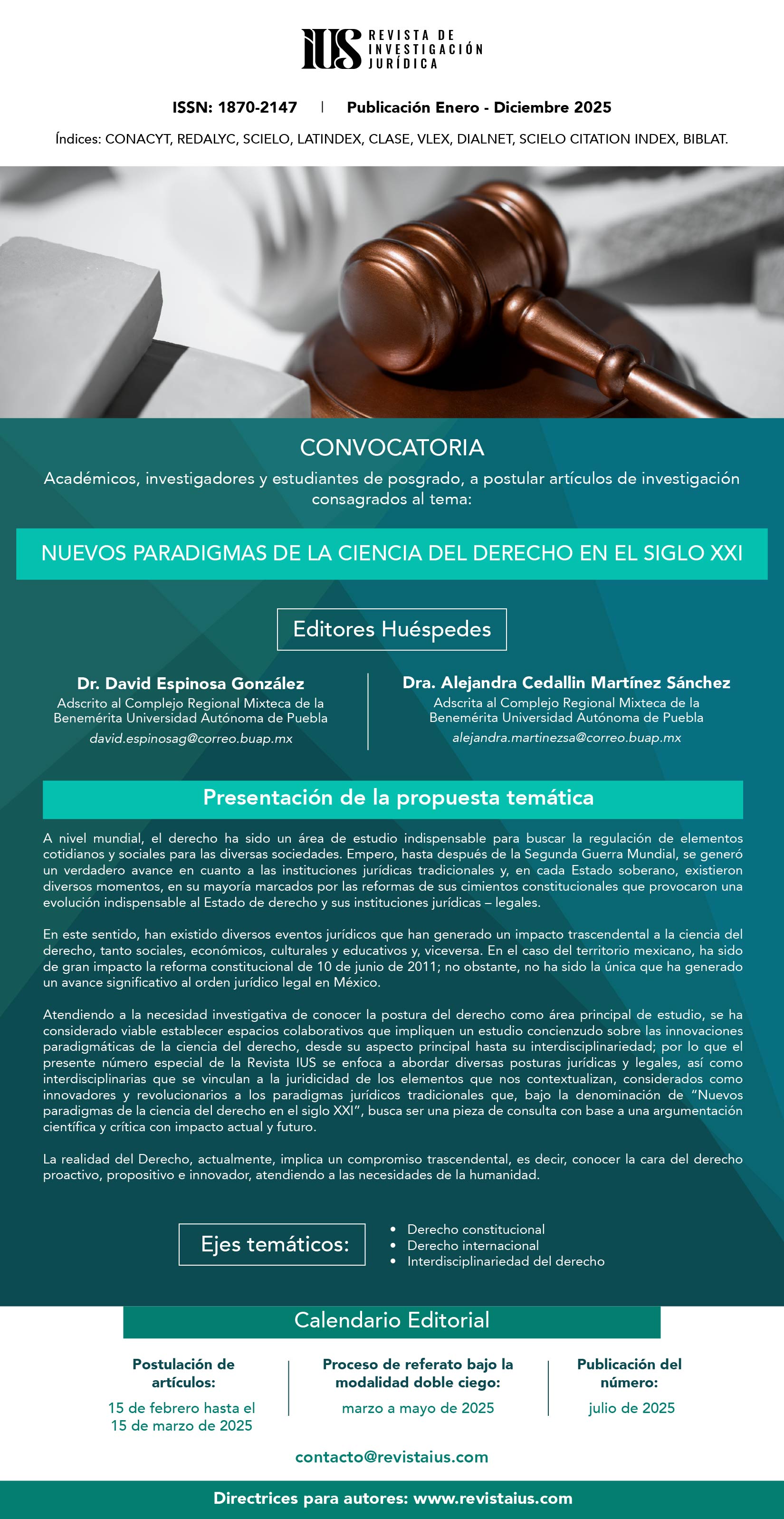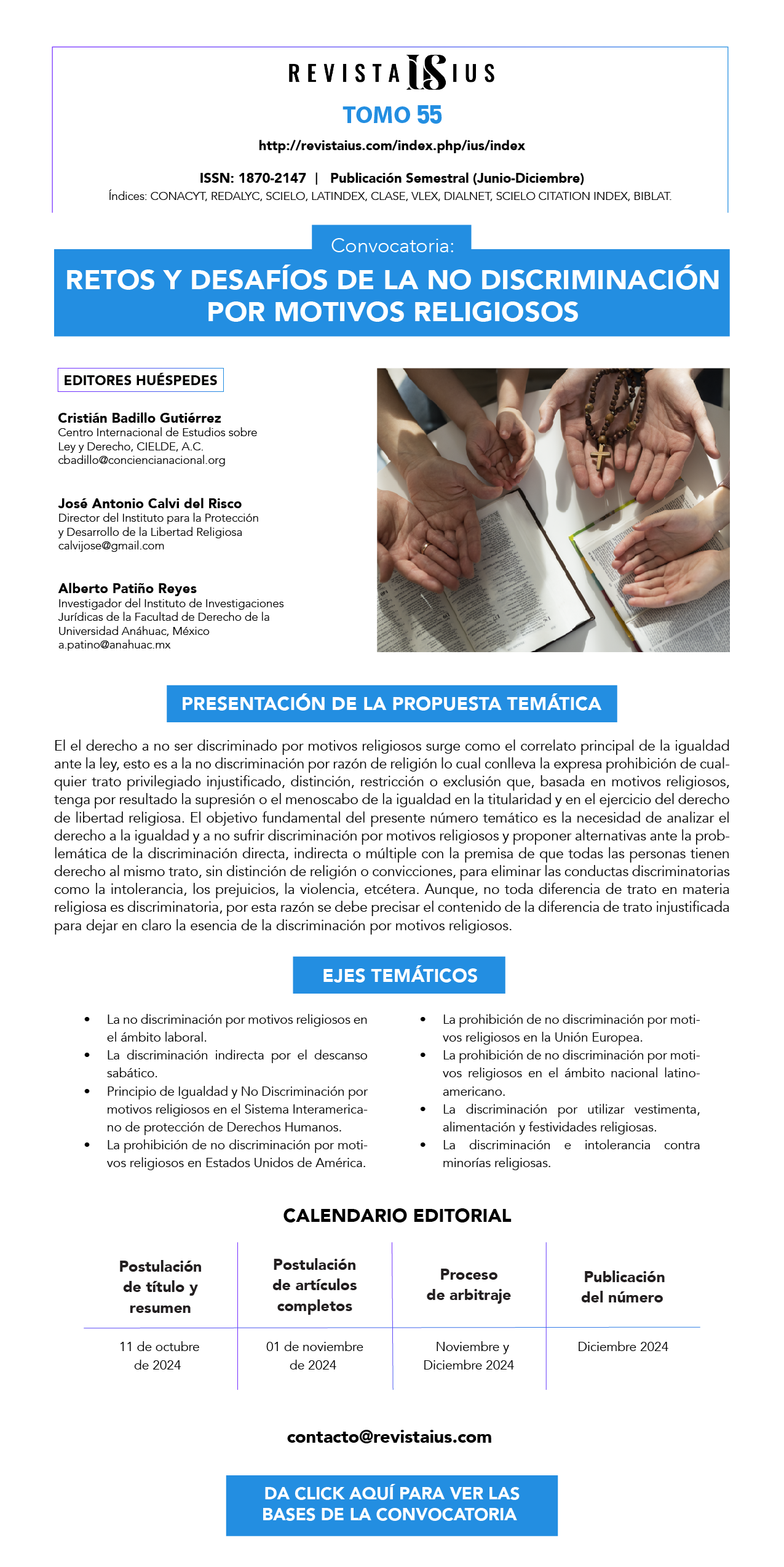Extra-contractual civil liability from the perspective of the economic analysis of the law and behavioural economics
DOI:
https://doi.org/10.35487/rius.v14i46.2020.580Keywords:
Análisis Económico del Derecho, Responsabilidad, Responsabilidad extra contractual, Indemnización, Negligencia, Derecho Civil, Economía del ComportamientoAbstract
El análisis económico de la responsabilidad civil extracontractual se enfoca en los efectos de las diversas reglas de responsabilidad por la causación de un daño, así como de la cuantificación de la reparación del daño, respecto del comportamiento tanto del agente del daño como de los afectados. Parte de la premisa de que la responsabilidad debe cumplir con el objetivo de internalizar los costos del daño, bajo el supuesto de la racionalidad económica, a fin de cumplir con las funciones disuasiva, preventiva y resarcitoria que caracterizan a este régimen. Si bien existe una amplia literatura en la materia, poco se ha abordado en el caso de los sistemas jurídicos codificados. Menos aún se han explorado las implicaciones que supone la economía del comportamiento, cuya característica esencial consiste en desarticular el supuesto de la racionalidad. En este artículo se analiza el régimen de la responsabilidad civil extracontractual previsto por el Código Civil de la Ciudad de México, desde la perspectiva del análisis económico del derecho. Además, se introducen los resultados obtenidos de un modelo experimental de la economía del comportamiento que ponen en tela de juicio la búsqueda de normas jurídicas eficientes que permitan internalizar los costos del daño.Downloads
References
Calabresi, Guido, “Some Thoughts on Risk Distribution and the Law of Torts”, The Yale Law Journal, Vol. 70, No. 4, March 1961, pp. 409-553.
Carreras, María, Voz “Responsabilidad objetiva”, Diccionario Jurídico Mexicano, Decimosegunda edición, México, Porrúa y Universidad Nacional Autónoma de México, 1998, p. 2840.
Código Civil para el Distrito Federal, México, publicado en el Diario Oficial de la Federación el 26 de mayo de 1928.
Coleman, Jules, “The Economic Structure of Tort Law”, The Yale Journal, Faculty Scholarship Series, Paper No. 4196, Vol. 97, 1988, pp. 1233-1253.
Cooter, Robert D. y Ulen, Thomas, Derecho y Economía, trad. de Eduardo L. Suárez, 3ra. Edición, México, Fondo de Cultura Económica, 2016.
Dari-Mattiacci, Giuseppe, “Tort Law and Economics”, Utrecht University Working Paper, 11 de febrero de 2003, pp. 1- 47.
Dari-Mattiacci y Parisi, Francesco, “The Economics of Tort Law: A Précis”, Tjalling C. Koopmans Research Institute, Discussion Paper Series 03-13, Utrecht School of Economics, September 2003.
Epstein, Richard, “A Theory of Strict Liability”, Journal of Legal Studies, núm. 151, 1973.
Fernández, Antonio, “La Responsabilidad Civil Subjetiva”, en Adame, Ángel (Coord.), Homenaje al Doctor Othón Pérez Fernández del Castillo por el Colegio de Profesores de Derecho Civil Facultad de Derecho-UNAM, México, Colegio de Profesores de Derecho Civil Facultad de Derecho-UNAM, 2017.
Friedman, David, What Economics has to do with Law and why it matters?, New Jersey, Princeton University Press, 2000.
Galindo Garfias, Voz “Responsabilidad civil”, Diccionario Jurídico Mexicano, Decimosegunda edición, México, Porrúa/Universidad Nacional Autónoma de México, 1998, p. 2826.
Halbersberg, Yoed and Guttel Ehud, “Behavioral Economics and Tort Law”, Zamir, Eyal and Teichman, Doron (eds.), The Oxford Handbook of Behavioral Economics and the Law, 2014.
Hastie, Reid, Schkade, David y Payne, John, “Juror judgement in civil cases: hindsight effects on judgements of liability for punitive damages”, Law and Human Behavior, vol. 23, núm. 5, octubre de 1999, pp. 597-614.
Karmin, Kim y Rachlinski, Jeffrey, “Ex Post Ex Ante Determining Liability in Hindsight”, Law and Human Behavior, vol. 19, núm. 1, 1995.
Jolls, Christine, Sunstein, Cass y Thaler, Richard, “A Behavioral Approach to Law and Economics”, Faculty Scholarship Series, Paper 1765, January 1998, pp. 1471-1550.
Landes, William and Posner, Richard, The Economic Structure of Tort Law, 1987.
Miceli, Thomas, The Economic Approach to Law, Stanford, California, Stanford University Press, 2004.
Polinsky, A. Mitchell, An Introduction to Law and Economics, 3ra. Edición, Nueva York, Aspen, 2003.
Polinsky, A. Mitchell, “Strict Liability versus Negligence in a Market Setting”, American Economic Review, 1980.
Posner, Richard, “Rational Choice, Behavioral Economics and the Law”, Stanford Law Review, Vol. 50, 1997-1998, pp. 1551-1575.
Posner, Richard, “Guido Calabresi´s `The Costs of Accidents´: A Reassessment”, Maryland Law Review, Vol. 64, No. 12, 2005, pp. 12-23.
Rachlinski, Jeffrey, “A Positive Psychological Theory of Judging in Hindsight”, University of Chicago Law Review, núm. 65, primavera, 1998, pp. 571-625.
Roese, Neal y Vohs, Kathleen, “Hindsight Bias”, Perspectives on Psychological Science, SAGE Journals, Septiembre de 2005.
Shavell, Steven, “Economic Analysis of Accident Law”, NBER Working Paper No. 9694, Cambridge, Mass., National Bureau of Economic Research, May 2013.
Shavell, Steven, Economic Analysis of Law, New York, Foundation Press, 2004.
Sunstein, Cass, “Behavioral Analysis of Law”, Program in Law and Economics Working Paper, núm. 46, 1997.
Suprema Corte de Justicia de la Nación, Tesis 1a. LII/2014 (10ª.), Gaceta del Semanario Judicial de la Federación, Décima Época, Libro 3, febrero de 2014, p. 683.
Downloads
Published
Issue
Section
License
Revista IUS, published by the Legal Sciences Institute of Puebla A.C., is distributed under the Creative Commons Attribution-NonCommercial 4.0 International (CC BY-NC 4.0) license.
We authorize collaborators to upload a copy of their published work on their personal websites or any Open Access repository, provided that Revista IUS is specifically cited as the original source, indicating the year and issue of the respective example and adding the link to the webpage on which this publication can be freely consulted in toto and without charge: http://www.revistaius.com
Readers are free to:
Share, copy and redistribute the material via any medium or format.
The licensor cannot revoke these freedoms as long as you follow the license terms.
Under the following terms:
Attribution: You must give appropriate credit, provide a link to the license, and indicate if changes were made.
You may do so in any reasonable manner, but not in any way that suggests the licensor endorses you or your use.
NonCommercial – You may not use the material for commercial purposes.
If you remix, transform or build upon the licensed material, its distribution is not permitted.
Charges for managing articles: Revista IUS will not charge for receiving, processing or publishing articles (Article Processing Charge, or APC) submitted by authors.





